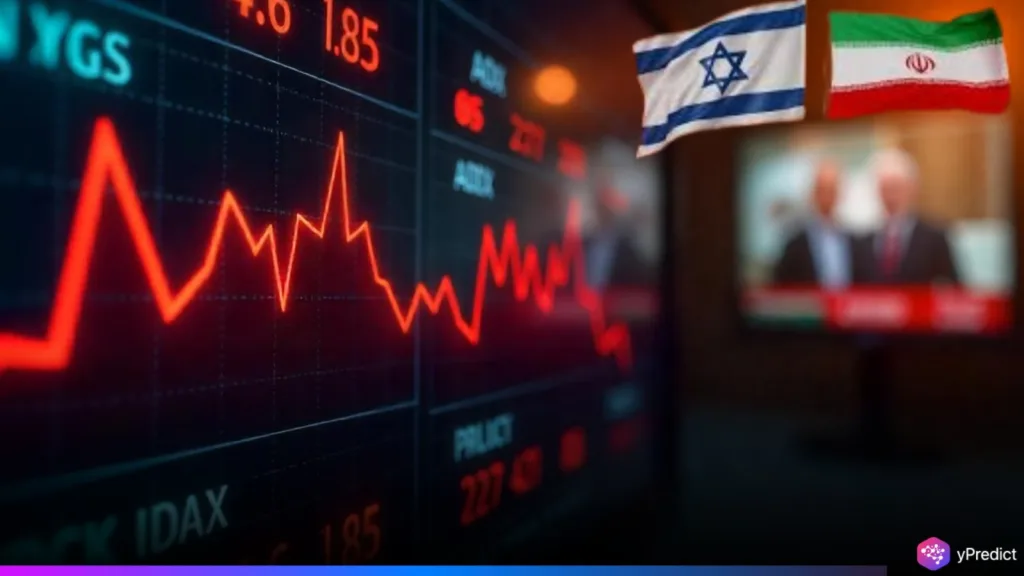
Gulf stock markets experienced sharp declines this week as the escalating conflict between Israel and Iran sparked a wave of investor anxiety across the Middle East. Renewed military confrontations, including Israeli airstrikes on Iranian infrastructure and retaliatory missile attacks, triggered widespread regional sell-offs. Energy stocks and airlines were among the hardest hit, while oil prices surged on fears of supply disruption through the Strait of Hormuz. As tensions mount and diplomacy falters, investors are bracing for further volatility. This report examines how deepening geopolitical instability is shaking Gulf economies, influencing oil markets, and reshaping risk perceptions across the global financial landscape.
Conflict Spillover Hits Markets Hard
Reuters reports that stock markets across the Gulf slumped on Sunday as renewed military strikes between Israel and Iran raised alarm over a broader regional conflict, rattling investors and stoking fears about energy security and geopolitical stability in the Middle East.
The heightened tensions began with Israeli airstrikes targeting key Iranian facilities, including nuclear research centers, missile production sites, and high-ranking military personnel, starting Friday and continuing through the weekend. Israeli officials framed the campaign as a long-term initiative aimed at preventing Iran from acquiring nuclear weapons.
In retaliation, Iran launched strikes on Israeli territory and abruptly withdrew from nuclear negotiations scheduled for Sunday. Tehran’s response included attacks that struck both military targets and civilian infrastructure, according to officials on both sides.
Market Reacts to the News
The escalation of hostilities between Israel and Iran sent shockwaves through financial markets worldwide, triggering a sharp sell-off across major indices on Friday and into the weekend. Heightened geopolitical risk and fears of broader instability led investors to retreat from equities.
In the United States, the Dow Jones Industrial Average dropped 1.79%, while the S&P 500 and Nasdaq declined 1.13% and 1.3%, respectively. The ripple effect extended to Asia, where Japan’s Nikkei 225 fell 0.89%, South Korea’s Kospi lost 0.87%, and Hong Kong’s Hang Seng slipped 0.59%. European benchmarks followed suit, London’s FTSE 100 edged down 0.39%, Paris’s CAC 40 shed 1.04%, and Frankfurt’s DAX retreated 1.07%.
Markets across the Middle East mirrored the global downturn, reacting strongly as the regional conflict intensified. Qatar’s stock index dropped nearly 3% in early trade, weighed down by declines in key companies such as Qatar Gas Transport, Nakilat (-3.1%), Qatar Electricity and Water Company (-1.7%), and Qatar National Bank (-3.3%).
Saudi Arabia’s benchmark index opened with a sharp 3.6% drop but trimmed losses to close 1.6% lower. In Kuwait, sentiment worsened as the main index slid over 4%, while Jazeera Airways plunged up to 10% amid airspace disruptions. Other regional markets also declined—Muscat fell 1.5%, Bahrain slipped 0.8%, and Israel’s Tel Aviv 35 opened 1.5% lower. In the UAE, Friday’s session closed with Dubai down 1.85% and Abu Dhabi off 1.47%.
Diplomacy Stalls as Tensions Mount
Despite attempts by regional players such as Oman to mediate, particularly around the now-suspended U.S.-Iran nuclear talks, the situation appears to be deteriorating. Goldman Sachs noted that while immediate risks to GCC economies may be limited if the conflict doesn’t expand, the region’s closeness to the turmoil could disrupt tourism, oil output, and shipping routes if tensions escalate.
Market analysts noted that the geopolitical escalation comes at a time when global equities are already under pressure due to rising tariffs and uncertainty over economic policy. According to several reports, the combination of surging oil prices and the potential for energy supply disruptions is fueling inflation concerns and forcing shipping firms to reconsider routes through the region.
As investors brace for further volatility, the Israel-Iran conflict has added a dangerous new dimension to an already fragile global economic landscape.







